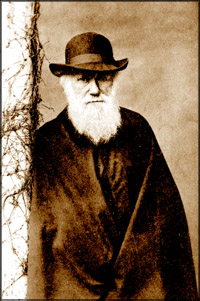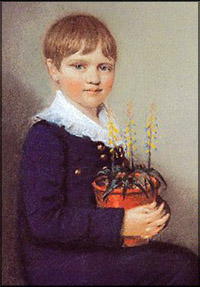|
In the Limelight
Charles Darwin:
Laid the foundations of biology
 If
you have heard about the theory of evolution and the theory of natural
selection, you are sure to know about Charles Darwin. He was the
'father' of these theories, which are generally accepted as the
foundations of biology. If
you have heard about the theory of evolution and the theory of natural
selection, you are sure to know about Charles Darwin. He was the
'father' of these theories, which are generally accepted as the
foundations of biology.
The English naturalist, Charles Robert Darwin was born in Shrewsbury
in Shropshire, England on February 12, 1809. He was the fifth of six
children of wealthy society doctor and financier Robert Darwin, and
Susannah.
Although Charles was baptised in the Anglican Church, he and his
siblings attended the Unitarian Chapel with their mother, and in 1817
joined the day school run by its preacher. In July 1817, when Charles
was eight years old, his mother died. From September 1818, he attended
the nearby Anglican Shrewsbury School.
In 1825, he went to the University of Edinburgh, Scotland to study
medicine, but was taken aback by the procedures of surgery and neglected
his medical studies.
In Darwin's second year, he joined the Plinian Society, a student
group interested in natural history and started studying subjects
related to evolution and biology.
In 1827, his father, unhappy at Darwin's lack of progress, enrolled
him in a Bachelor of Arts course at Christ's College, Cambridge to
qualify as a clergyman. He did his finals in 1831 and performed well in
theology, though just scraping through in classics, mathematics and
physics.
It was around this time that he was recommended for the voyage on the
ship, HMS Beagle, which was to leave on an expedition to South America.
Although his father initially objected to the two-year voyage, he was
later persuaded to let Charles go, by a relative.
During the five-year Beagle survey, Darwin carefully noted a variety
of geological features, and collected many fossils and living organisms,
some completely new to science. He sent some of these specimens to
Cambridge together with letters about his findings; these cemented his
reputation as a naturalist. He made many geological discoveries too
during this expedition.
Darwin's compositions sent from the Beagle had by now been seen by
many reputed naturalists that, when the Beagle returned on October 2,
1836, he had become a celebrity in scientific circles. His father
organised investments so that he could work as a self-funded scientist.
Darwin continued with his scientific work and writing, but fell ill
under the strain of overwork. In September 1837, he had "palpitations of
the heart" and was advised by his doctor to rest. Thus he went back to
Shrewsbury to visit his relatives and during this visit, became
interested in the role of earthworms in soil formation, which later
became another one of his pet topics.
Around this time, he was pushed to take on the duties of Secretary of
the Geological Society. Although he declined this extra work initially,
he accepted the post in March 1838. The strain took its toll, and he
started suffering from stomach problems, headaches and heart symptoms.
For the rest of his life, he suffered from various illnesses.
On January 24, 1839, Darwin was honoured by being elected as Fellow
of the Royal Society and on January 29, 1839, he married his cousin Emma
Wedgwood. The Darwins had ten children: two died in infancy, and his
daughter Annie died at the age of ten.
|

The seven-year-old Charles Darwin in 1816, one year before his
motherís death. |
Most of the other surviving children went on to have distinguished
careers as notable members of the prominent Darwin-Wedgwood family.
Darwin's eight years of work on barnacles (Cirripedia) earned him the
Royal Society's Royal Medal in 1853, and made his reputation as a
biologist.
In 1859, his The Origin of Species was published, earning him a lot
of praise and criticism too. It generated many public debates; although
Darwin's illness kept him away from these debates, he read eagerly about
them and raised further support through correspondence.
Darwin's friends formed The X Club and helped to gain him the honour
of the Royal Society's Copley Medal in 1864. The Origin of Species was
translated into many languages and went through numerous reprints,
becoming a staple scientific text and a popular reading material.
Despite regular illness during the last 22 years of his life, Darwin
continued with his work. His experiments, research and writing went on.
The question of human evolution had been taken up by his supporters
shortly after the publication of The Origin of Species, but Darwin's own
contribution to the subject came more than ten years later with the
two-volume The Descent of Man, and Selection in Relation to Sex
published in 1871.
A year later, Darwin published his last major work, The Expression of
the Emotions in Man and Animals, which focused on the evolution of human
psychology and its continuity with the behaviour of animals.
He died in Downe in Kent, England, on April 19, 1882. He had expected
to be buried in St Mary's Churchyard at Downe, but a state funeral was
arranged for him and he was buried in Westminster Abbey, close to John
Herschel and Isaac Newton.
Darwin has been honoured, with many species and geographical features
being given his name. The city named Darwin, Port Darwin, Charles Darwin
University and Charles Darwin National Park (all in Australia), Darwin
College in Cambridge, the 14 species of finches he had collected in the
Galapagos Islands and which are affectionately named "Darwin's Finches"
are some of these.
In 1992, Darwin was ranked No. 16 on Michael H. Hart's list of the
most influential figures in history. He came fourth in the 100 Greatest
Britons poll sponsored by the BBC and voted for by the public. In 2000
Darwin's image appeared on the Bank of England ten pound note.
The fact that evolution occurs became accepted by the scientific
community and the public in his lifetime, while his theory of natural
selection came to be widely seen as the primary explanation of the
process of evolution in the 1930s and now forms the basis of modern
evolutionary theory, are more of the major honours bestowed on him. |
